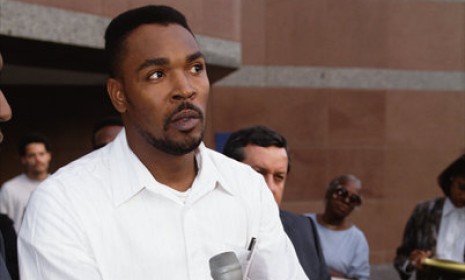The complicated legacy of Rodney King
King became famous for being beaten within an inch of his life by Los Angeles police, but he'll be remembered for much more

A free daily email with the biggest news stories of the day – and the best features from TheWeek.com
You are now subscribed
Your newsletter sign-up was successful
On the night of March 3, 1991, four white Los Angeles police officers inadvertently made Rodney King, who was black, a household name, viciously beating him after a car chase while an amateur videographer captured the incident on tape. A year later, when the four officers were acquitted of brutalizing King, African-American neighborhoods in Los Angeles erupted in anger, starting one of the biggest race riots in U.S. history. King, 47, was found dead early June 17 at the bottom of the swimming pool at the house he shared with fiancée Cynthia Kelly. Here are five ways the reluctant civil rights icon still lives on:
1. King's beating sparked an ongoing conversation on race
The evidence of King's fateful encounter with the LAPD — the videotape and the image of his battered face, "swollen beyond recognition" — set off a chain of events that forever changed "the racial conversation in the United States," says Cathy Scott at Forbes. It was proof that black people were frequently treated differently, and more harshly by the authorities, and the riots afterward showed that many of them were very angry about it. "We thank God for the use of Rodney King's life to lift us to a higher degree of consciousness," said Rev. Jesse Jackson, in response to King's death.
The Week
Escape your echo chamber. Get the facts behind the news, plus analysis from multiple perspectives.

Sign up for The Week's Free Newsletters
From our morning news briefing to a weekly Good News Newsletter, get the best of The Week delivered directly to your inbox.
From our morning news briefing to a weekly Good News Newsletter, get the best of The Week delivered directly to your inbox.
2. It also shone a harsh light on police brutality
Specifically, the King beating introduced a national audience to police brutality and racial profiling, says Marisa Taylor at ABC News. That changed how police departments interact with minority communities, and expanded the model of community policing credited with bringing down crime rates. The biggest change was in L.A. itself, say Paul Pringle and Andrew Blankstein at the Los Angeles Times: The King beating and riots forced out powerful, hard-handed police chief Daryl Gates, brought in the first black chief, limited L.A.'s top cop to two five-year terms, brought the LAPD under civilian control, and "clearly set in motion a generation-long transformation of the LAPD that shapes today's far more accountable, respected, and diverse department."
3. We're still asking King's big question: "Can we all get along?"
On the third day of rioting, King gave a press conference in which he famously said: "Can we all get along?" His "plea distilled centuries of racial strife into a challenge — and a goal," says Jesse Washington of The Associated Press. And his "simple yet profound question still lingers, from the street where Trayvon Martin died all the way to the White House." At the time, the plea was seen as both endearingly earnest and ridiculously feckless and naive, since $1 billion worth of L.A. was burning and at least 54 people were dead. But King gave us an example with his own life, shunning anger and forgiving the cops that beat him, says Gina Tenorio at Patch.
A free daily email with the biggest news stories of the day – and the best features from TheWeek.com
4. Videotaping cops went mainstream
None of us would ever know about King but for a man named George Holliday, who used his video camera to capture the beating on grainy tape. He gave the tape to a local TV station, then it got picked up by 1991's version of YouTube — CNN — and went viral. That "launched a trend of bystanders filming police behavior (and misbehavior), followed by the police's authoritarian and sometimes violent responses," says Scott Shackford at Reason. Some police officers have become more accountable, but the battle between cops and videographers continues today.
5. Sometimes history makes heroes of flawed people
The beating turned King — an ex-convict who was pulled over while driving drunk — into a sort of civil rights icon, but he certainly "never set out to be a James Meredith or Rosa Parks," say Joe Mozingo and Phil Willon at the Los Angeles Times. And "from the beginning, King had faltered in his role as a symbol and was tormented by his failings," including frequent run-ins with the law, drug and alcohol abuse, and one incident where he ran down his then-wife in a car. "Whatever the transgressions of his life, he caused, however inadvertently, profound change," and he knew it. In April, when his memoir came out, King told the L.A. Times that despite nearly dying from his beating, if he had the choice "I would go through that night, yes I would. I said once that I wouldn't, but that's not true. It changed things. It made the world a better place."
Sources: AP, CNN, Forbes, Los Angeles Times (2), New York Times, Orange County Register, Patch, Reason
-
 Why are election experts taking Trump’s midterm threats seriously?
Why are election experts taking Trump’s midterm threats seriously?IN THE SPOTLIGHT As the president muses about polling place deployments and a centralized electoral system aimed at one-party control, lawmakers are taking this administration at its word
-
 ‘Restaurateurs have become millionaires’
‘Restaurateurs have become millionaires’Instant Opinion Opinion, comment and editorials of the day
-
 Earth is rapidly approaching a ‘hothouse’ trajectory of warming
Earth is rapidly approaching a ‘hothouse’ trajectory of warmingThe explainer It may become impossible to fix